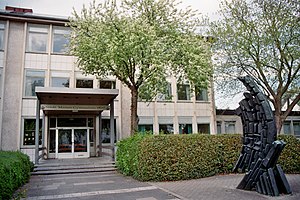Marien-Gymnasium Werl
| Municipal Marien-Gymnasium Werl | |
|---|---|

|
|
| type of school | high school |
| School number | 170410 |
| founding | 1907 |
| address |
At Breilsgraben 2 |
| place | Werl |
| country | North Rhine-Westphalia |
| Country | Germany |
| Coordinates | 51 ° 33 '17 " N , 7 ° 54' 15" E |
| carrier | City of Werl |
| student | 1061 (as of 2017) |
| Teachers | 86 (as of 2017) |
| management | Michael tested |
| Website | www.mg-werl.de |
The Städtische Marien-Gymnasium Werl , founded in 1907 as a municipal boys' school in the form of a Progymnasium with alternative English lessons, was under spiritual direction for many years. After a long break, the school took up the almost forgotten tradition of a small Latin school in the former Electoral Cologne town of Werl .
Predecessor schools
A previous school is mentioned in the city area in 1419, 1463 and 1473 as a school of scholars, corresponding to a today's higher school. A new schoolhouse was built in 1558 on the site of today's Walburgahaus near the provost church. The portal of the old Latin school has been preserved in this house . On the distich in the crossbar, the inscription is preserved: Dogmatis ut Christi placidae virtutis asilon nostra petat pubes haec nova structa schola Anno Domini 1558 (so that our youth receive a home of peaceful virtue according to the teachings of Christ, this new school was built in the year of the Lord in 1558 been). In 1779 the city council decided to build a real grammar school , the teachers provided the Werler Capuchins . The responsible electoral authority in Bonn approved the project. Werl got his first Mariengymnasium, which was closed again in 1787 on the instructions of Maximilian Friedrich of Cologne. The elector feared too strong competition for the high schools in Geseke and Arnsberg. The Latin school remained.
School history
In 1912 the Progymnasium became a full grammar school, which was headed by the director Johannes Spieker , a clergyman of the diocese of Paderborn . A Konvikt , a boarding school owned by the Paderborn bishop, which was planned when the Progymnasium was founded , offered especially boys from the rural surroundings of Werl, including those from the nearby Sauerland , who were aiming for a clerical profession, the chance to attend a grammar school.
During the time of National Socialism , the spiritual headmaster was relieved of his office. The Marien-Gymnasium became a "German High School for Boys". Immediately after the end of the war, the school, the building of which had been destroyed by a German bomber plane after the occupation of the city of Werl by American troops, reopened its doors - initially in borrowed rooms - as a municipal humanistic grammar school. In 1948, as before the Nazi era, a spiritual director was appointed at the suggestion of the Archbishop of Paderborn. This director, Rudolf Preising , later became an honorary citizen of Werl, mainly because of his services to research into local history.
The high level that the small-town humanistic grammar school reached in the years after the Second World War can also be seen from the fact that one of the teachers, the Latinist Heinz Heubner , recognized his academic achievements (publication of a critical edition of the works of Publius Cornelius Tacitus ) received an honorary doctorate from the Basel Faculty of Philosophy and was awarded the title “Professor” by the State of North Rhine-Westphalia. Another, Hugo Staudinger , was appointed professor of history at what was then Paderborn University.
In 1968 the school received a non-spiritual director for the first time (apart from the Nazi era). It developed from a humanistic grammar school to a modern-language-scientific grammar school, which also continued to offer the old languages, and from a boys' grammar school to a coeducational school.
Today's four-class school has played a culturally important role in the central town of the western Soest district, which is also well-equipped with secondary schools, for 100 years now. The Marien-Gymnasium is also Werl's largest school with more than 553 students and 508 students as well as 50 teachers and 36 teachers (as of 2017).
Views
Well-known students and teachers
- Alfred Dregger (1920–2002), politician (CDU), was a student
- Andreas Englisch (* 1963), journalist and non-fiction author, was a student (Abitur 1983)
- Uwe Grauer (* 1970), soccer player and coach, was a student (Abitur 1989)
- Friedrich Hüttemann (1875–1945), priest, philologist and hymn author, from 1914 to 1934 headmaster of the grammar school
- Wilhelm Schamoni (1905–1991), Roman Catholic theologian, founder and editor of the magazine Theologisches
- Hugo Staudinger (1921–2004), historian and scientific theorist, was a teacher
- Rudolf Preising (1904–1981), priest and local history researcher, from 1948 to 1968 headmaster of the grammar school
literature
- Gerhard Bönnemann (†), Ludwig Siegeroth, Siegfried Hein, Alwin Kunz (†), Erwin Hachmann, Franz Berning (†), Karl Tilke, Rudolf Löer, Franz-Josef Hense: 75 years Marien-Gymnasium Werl. 1907-1982 . Dietrich Coelde, Werl 1982, 131 pp.


